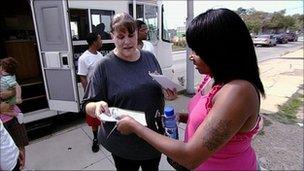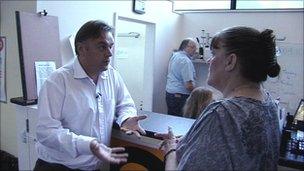Drugs charity in talks with controversial US campaigner
- Published

Barbara Harris has been campaigning for 13 years
A charity which helps drug addicts in south Wales is in talks with a controversial US campaigner who offers addicts cash to be sterilised.
Kaleidoscope may stock leaflets from Barbara Harris, whose opponents say she does more harm than good, BBC Wales' X-Ray programme reveals.
The Newport charity emphasised it would not pay for sterilisation treatments.
Ms Harris works to cut the number of children born affected by their parents' habit.
Every year in the UK, it is estimated more than 1,000 babies are born to mothers addicted to drugs or alcohol.
They can suffer physical and mental health problems and cost the NHS hundreds of pounds a day to look after.
American campaigner Ms Harris pays addicts cash to be sterilised. She started her work 13 years ago after having adopted four children from one drug addicted mother.
Tours country
She set up Project Prevention to reduce the number of children born affected by their parents' addiction and has paid thousands of American addicts $300 each to not have children.
She tours across the country every year to attract new recruits.
She said: "Just knowing every mile we drive is for good. Somebody driving by might have a daughter who is strung out on drugs and could get pregnant, so they'll give them our phone number or call us up."
In the US, Tina, a recovering crack addict who lost a baby after she continued to smoke drugs while she was in labour, said she took Barbara's $300 to be sterilised.

Barbara Harris speaks with Reverend Martin Blakebrough
She said: "If you're using drugs and you don't care enough about your own body, care enough about the baby. The baby deserves a really good chance at life.
"And how's that baby going to have a shot with drugs and alcohol?"
Ms Harris is in talks with Kaleidoscope about stocking her leaflets, which carry the image of a baby in drug withdrawal and offer cash for sterilisation.
The Reverend Martin Blakebrough, Kaleidoscope's director and the son of the charity's founder, said: "In terms of sterilisation I think it is something you need to be talking to people about, you need to be advising them, and supporting them if that is the right decision for them.
"I see three generations of people, families of drug misuse, grandparents, mothers and their daughters. We have to try and find some ways of breaking that cycle."
Prevention process
He said Ms Harris' policy was not one that he agreed with entirely, saying: "We made it clear to her that if we did have a leaflet then it would need to be redesigned because the leaflet that she has is quite sensationalist and we would want to tone that down.
"But we do believe in giving clients choice and if they felt that was a project they wanted to be involved with, particularly on the situation of prevention and support for them through that prevention process, we would be happy to stock a leaflet."
However, he made it clear Kaleidoscope would not be offering clients cash to be sterilised.
Recovering heroin addict Michelle uses the charity's service in Newport and has seven children already and does not currently use contraception.
She said she would not consider sterilisation herself, saying: "I feel that I'm stronger now and wiser now than I used to be, so I think it's a very, very, very unfair thing to be coming across, that drug addicts should be getting sterilised just because they're addicts.
"That doesn't make them unfit. People have still got morals whether they're a drug addict or not."
Dr Bernadette Hard, a GP at Kaleidoscope, who offers medical advice including discussing contraception with clients at the charity, said she had seen addicts turn their lives around.
She said: "A client recently came over from London, two children were being threatened to be taken off her, she said to me, 'I'm not using any more'.
"She's really moved on, her children are very well looked after and she's a great mum. If she has more then, good luck to her."
Questions are being asked about whether Ms Harris' approach is even legal.
The British Medical Association's ethics committee has met to discuss the issue.
Committee chairman Dr Tony Calland said: "The difficulty we have with this particular issue is that we think giving a large amount of money to someone with a very powerful addiction would probably encourage them to spend money on their addiction rather than perhaps on improving their own health or the health of their children.
"It would be dreadful if they made decision on the basis of getting money in their early 20s that they would regret when they had overcome their addiction perhaps in their 30s."
is on BBC One Wales on Monday, 18 October at 2235BST.